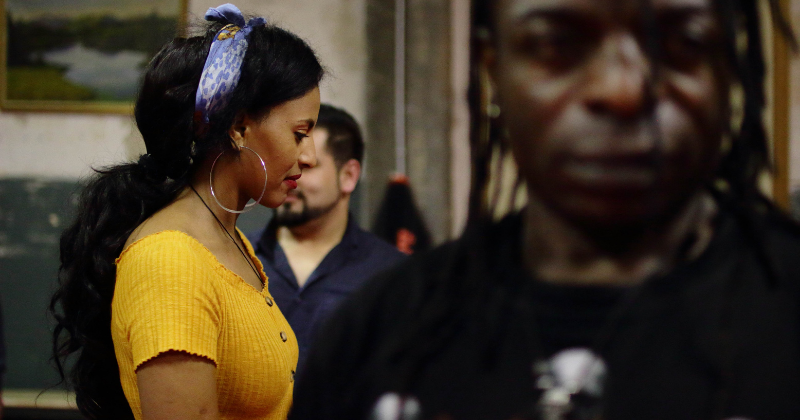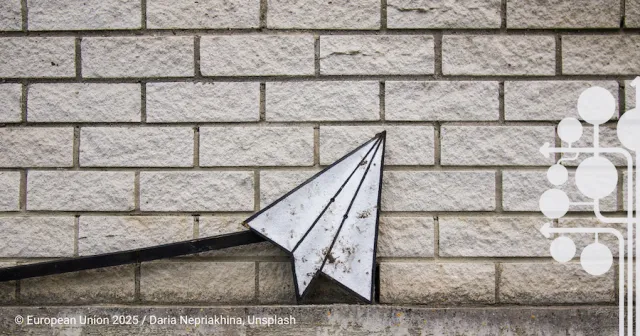Stefan Perceval: with heart and hand
Short bio
I am an actor, theatre director and have been the coordinator of theatre company HETGEVOLG in Turnhout (Belgium) for seven years. Besides the traditional performances, HETGEVOLG has been making Heart Projects with special target groups: non-native newcomers, young refugees, people in poverty… I have been an actor for 26 years, and I have been doing this kind of work - working with people - for 16 years.
My EPALE
I know EPALE very well and have already participated in some conferences (you could still attend them in person). I gave a workshop at the EPALE conference in Aachen.
My Story
The theatre company HETGEVOLG has a big heart for people who fall outside the regular social circuit: newcomers who speak a different language, young refugees, people in poverty… We set up projects with them and give 'the Other' a face with a story. A story that everyone can identify with. So that 'the Other' is brought closer. The power of theatre also ensures that they rediscover the strength within themselves and find the courage to join in with everyday life. Working together means getting to know one another, bringing out each other's strengths and, en passant, sharpening social and language skills.
Inclusive learning workplace
In addition to a theatre trajectory, a practical trajectory has been running for a year now. The province of Antwerp gave us the opportunity to start up an 'inclusive economy' project. This means that we offer people from vulnerable groups a learning workplace. The province calls this an 'inclusive economy', we call it 'With heart and hand'. Because what the heart does not feel, the hand cannot do. Parallel to our theatre projects, a workshop is organised in which these people can make sets (and become proficient in welding, woodwork, technical drawing, painting…) and master the tricks of light and sound technique (knowledge of materials, acoustics, electrical engineering, etc.). During this process, they learn the necessary attitudes which a person must have in order to be able to participate in a job. In a final phase, they are further coached by program counselors from employment agencies. In concrete terms, this means that for two years we want to give these people the time of their lives three days a week. We are the first arts organisation in Flanders to start such an 'inclusive economy' project.

Ministry of Dreams
People come to us through employment agencies, refugee agencies, social welfare centres... They can opt for theatre, for the practical route or for both. What skills do they need to participate? Being curious: about the other person, the theatre and about themselves. Our house is a ministry of dreams. One of my first questions is “Tell me your dream”. Here they can, and are allowed to, work on a dream. They also have to be able to express that dream and that in itself is not easy for many. Often this is not possible within the structure of a school. Here it is easier, art can give that insight.
Warre came here not knowing what he can do with, or what he wants from, his life. He was waiting to see which way the cat would jump. But here he had to speak out. And then he’ll come up with ideas. He found solutions to a decor problem. And he could even weld. So, he made sure that the decor was in order. He was allowed to think and was also given the responsibility. Suddenly we saw him taking steps and he saw that too. Those experiences are better than at school, he picks up again and keeps participating.
Odd duck
We don't have a method for that. The ‘Perceval method’ does not exist. There is no plan or script in advance. We look at each person’s background and we start from there. Each course is therefore a personalized course. And that works in practice. Defending an economic dossier on the basis of this approach is not easy. The support from the province is therefore very exceptional. Of course, they also ask for a report, data is becoming increasingly important. That’s why we document each individual process very comprehensively. We don’t do impact measurements with questionnaires etc. unless for really measurable parts, such as language evolution. We communicate well with the government about how we are working on this. But we are the odd one out just because we are an economic project. Not everyone in the arts sector is ready for this and they want to shift our work to welfare. But I like being the odd one out.
Behind the wall
Our support is professional. The place and the environment in which we work are also professional. Our office is like Camp Nou. That's important - it shows respect. There is also a goal, we make a performance, so it is serious. We can’t have a 'we'll see' attitude. Some of the people here come from an environment where there is no pressure. They are no longer used to working towards something. That's not motivating. We want to achieve something, and we appeal to people for their talent. We let them see behind the wall. It all starts from within them. And they are not alone in that. Many great artists start from a knot which they are struggling with.

I'm a survivor
Beyoncé's first hit I'm a survivor starts from failure, from her experience of always having to start over. That's a good message. Her latest album tells of Jay Z's deception. She starts from a story of bad experiences. And the people in our Hearts Projects know that story all too well. The power of art is that they get to work with their own story, like Beyoncé, Picasso, Nick Cave... That's how we make people think, “Damn, I'm worth something!”. Neither the social worker nor the director will solve their problems. They have to find that solution themselves: how a scene unfolds, how they express themselves in their dialogue, in the confrontations of every day. We try to get rid of that, look for solutions, do it ourselves.
This does not work for everyone, it is not always a success story. Some people want to be left alone and won't take matters into their own hands. Or they don't have a click with theatre. They have great stories, but they want to, and are allowed to, keep them for themselves. Others get maybe disappointed in theatre. They might have wanted to move on, to the big theatres. But those big theatres not always want to work with them, unless it’s as an excuse or window dressing.
Corona
HETGEVOLG is not doing this to polish its image. I've been working like this for 16 years. We haven’t been idle for a day during the Covid-19 pandemic, we have worked individually, we are on the streets, in squares. That’s necessary, we have to act. Poverty is rising and through art we can connect with it. Our theatre work is in great demand: in schools, for social welfare centres, for community work, municipalities. Art can be a connecting factor between people or between 'departments', such as the link we are now making with the economic department and employment. With art as a motor, we try to make people grow.






There is so much potential…
There is so much potential in theatre work - thank you for making it happen!